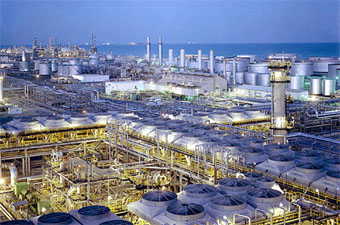
Photo courtesy of Saudi Arabia Aramco
OPEC Agrees to Production Cuts
| published December 2, 2016 |
By Keith H. Roberts, Thursday Review contributor
OPEC agreed to cut production of oil and gas production this week, breaking an eight-year stalemate in which member nations were unable to reach an agreement to more tightly manage production. The move came as a surprise to many energy and oil analysts who had predicted another deadlock emerging from this latest meeting of the representatives of oil producing countries, even as word of the production cut sent crude oil prices soaring in New York and in other markets.
With the slide in oil prices worldwide entering the start of its third year, OPEC members apparently found something to agree upon: slumping prices were working to the benefit of none of the producers, and that at least a short term reduction in output might help to reduce inventories and throttle demand.
The agreement comes after nearly two years of wrangling between several of the major OPEC parties, including Saudi Arabia, Iraq, Venezuela, Kuwait and Iraq—all of whom had their own agendas or their own reasons to keep production levels high. Adding to the complex mix: relaxed economic sanctions against Iran. Iran is now selling its own substantial oil supplies on the open market and adding to the global glut.
Oil prices have been falling for several years, most sharply in the period beginning in early 2014. Saudi Arabia has been producing oil at a frenetic clip, some analysts believe in a not-so-subtle effort to undercut demand for alternative energy vehicles in the United States and other countries, and as a way to undermine major efforts in the U.S and Canada to bolster the shale oil business. Saudi Arabia may have also seen lower U.S. prices as a way to blunt desire on the part of western oil companies to deploy more oil platforms to the Gulf of Mexico and other regions closer to the Americas.
Russia, facing a variety of economic problems—including a deep recession and economic sanctions imposed by the U.S. and the E.U. for its annexation of the Crimea and its backing of pro-Moscow militants in the Ukraine—has been steadily increasing the output of its oil and gas fields as well, in large part to keep the cash flowing. Iraq, finally regaining lost ground in its 2-year-plus struggle with ISIS, which for a time took control of several major refinery operations within its borders. Venezuela’s economic woes are serious and deep, and one of the few ways that the country has been able to cope with an economy at the brink of collapse has been to keep oil production levels running high.
The agreement by OPEC to cut production was not without discord and disagreement, but the move still startled many experts who had little reason to expect the disparate interests of the oil producing nations to sufficiently overlap in a rapidly changing global economy.
For Saudi Arabia, Kuwait and Iraq, the move may have the ironic effect of again spurring demand for more fuel efficient cars in the United States, and nudging the development of alternative enrgy vehicle along the development track even faster.
Related Thursday Review articles:
Shell Suspends Operations in Alaskan Waters; R. Alan Clanton; Thursday Review; September 28, 2015.
Will Low Oil Prices Delay Electric Car Rollouts?; Keith H. Roberts; Thursday Review; May 6, 2015.
